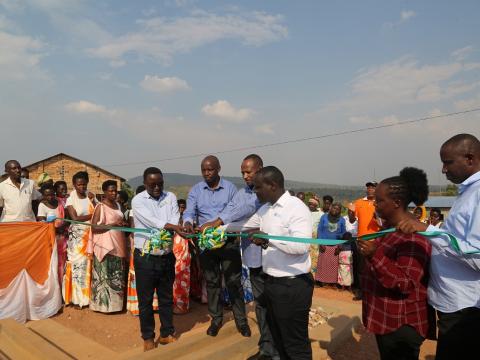Working Together Towards Universal Access to Clean Water and Proper Sanitation in Rural Rwanda

In many developing countries, including Rwanda, about 80% of illnesses are the result of poor water and sanitation conditions. Infants and young children are especially vulnerable to diseases because of their weak immune systems. Even in more developed countries, mothers take extra precautionary measures of boiling water before giving it to them. Children who don’t have access to clean water are often forced to miss school because of waterborne illnesses. When children can't go to school, they miss out on a chance to learn, which perpetuates the cycle of poverty. People living in poverty tend to feel the consequences of the lack of safe water and sanitation the most because in addition to lacking clean water and proper sanitation, they also frequently lack medical resources. This means that not only do they get sick more often, they also have a harder time recovering. All of this hinders academic achievement and productivity, making it even more difficult for them to escape poverty.
The government of Rwandan has identified the unequal access to clean water and proper sanitation as a key problem to be addressed and has laid out strategies aimed to achieve universal access to clean, safe water and sanitation across the country by 2024. Their ambitious plan requires the support of organisations like World Vision. On the 24th of September, 2019, staff from World Vision's team in Rwanda along with the local government officials and various partners, celebrated the launching of a water supply system that will bring clean drinking water to 5,630 people from 7 different villages in Mbazi, and Sovu sectors.
Local residents expressed their gratitude to World Vision and the Government of Rwanda for their efforts in providing safe drinking water to the population located in remote areas.
“Prior to today, we went through a lot just to get water that would cause further damage to our health. Some other challenges we faced on a daily basis included schools drop out or delays, water-borne diseases due to the use of dirty water from swamps. [We also] spent many hours fetching water when we could have been working,” said a community member. “from today, I will only be walking about 10 minutes and many of these challenges will be eliminated.”
During the event, partners and stakeholders who work together with World Vision and the Government of Rwanda to improve Water Sanitation and Hygiene (WASH) services in the Huye District authorities and District WASH Board members were in attendance. They visited World Vision initiatives throughout the District in the spirit of looking at how World Vision is supporting the district to reach universal WASH coverage by 2024. The Vice-Mayor in charge of Economic affairs in Huye District, Mr. Kamana André voiced his commitment to working with other stakeholders to make sure that district residents get full access to water and sanitation services. He recognized World Vision International for “its valuable contribution to the district”. He also called upon all partners and stakeholders to join efforts to reach this goal of universal access to clean water by 2024.